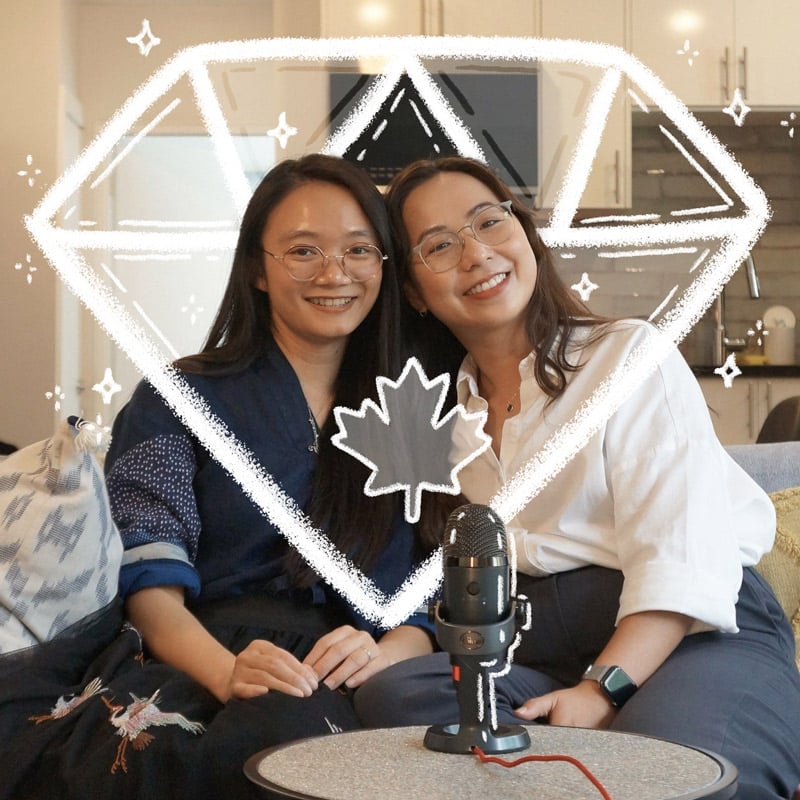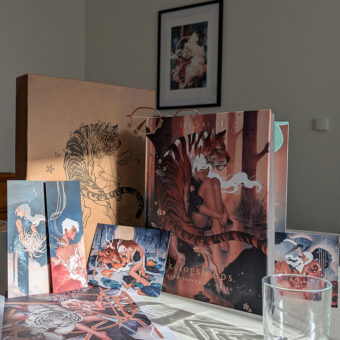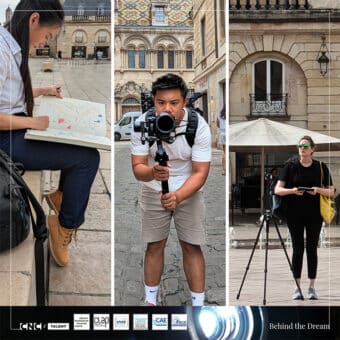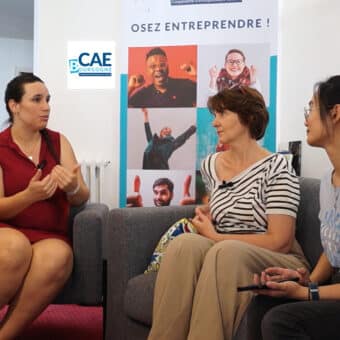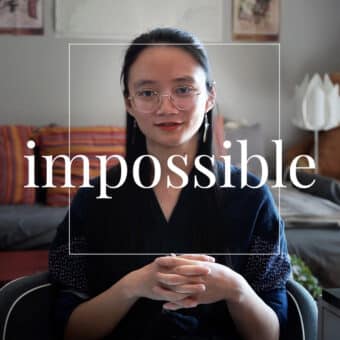This article was co-written with my editor-in-chief, Jo, and my long-time friend, KL.
“Creation stories” is our periodic rendez-vous that for each season of the year, I will meet a creator and record his or her story. Creating can either be the main job of our guests, one of their jobs, or just a pure hobby.
With this series of creation stories, I hope to break the clichés that have been widening the gap between public’s vision of creative professions and the reality we, as creatives and creators, live within.
Autumn guest: Chi Nguyen, The Present Writer
If you are interested in contents related to education, personal development and minimalism, especially in Vietnamese, chances are you have already heard of The Present Writer, Chi Nguyen’s brand.
And if we look at the list of missions below that Chi carries out every day, there is a good chance we’ll be overwhelmed.
Chi obtains her PhD in Education. She is now working as a professor at the University of Arizona in the United States. She is also the author of the first book on minimalism in Vietnamese. She is known more widely as a blogger (with around 80,000 readers a month in September 2023); a youtuber (600,000 subscribers in October 2023); a podcaster (over 200,000 listens a month in 2022).
This year, Chi launched her first stationery product: The Present Day planner.
What’s more, she is mother to a toddler.
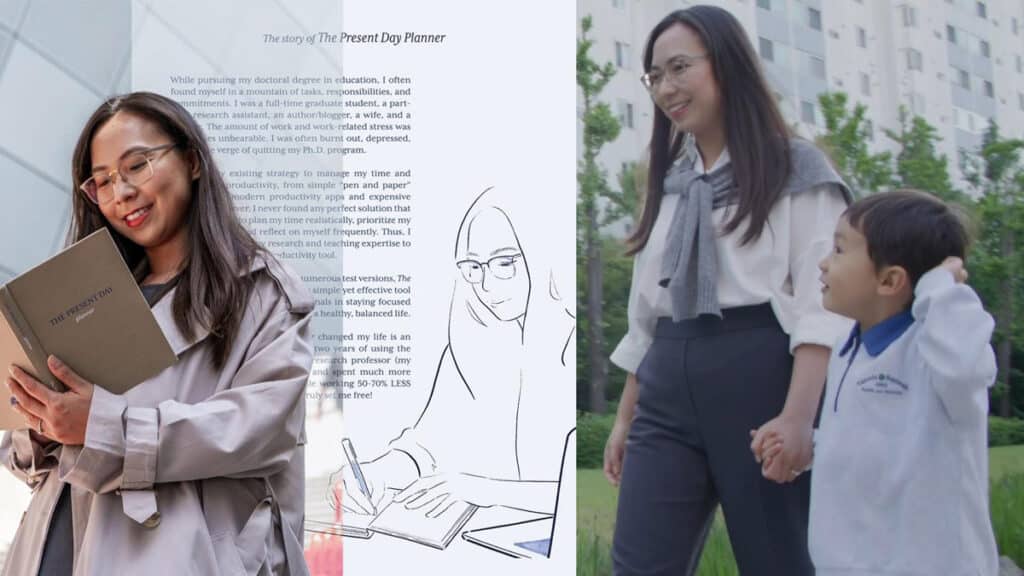
With the information above, it would only reasonable for us to think that Chi Nguyen must be somewhat a superhuman, or that she must have been very lucky, or that she should have a very good financial situation to fulfill both her professional and personal life.
But isn’t that what we often think every time we see a “superhuman” individual in the same genre?
What if today we were to discover the precise steps (five polishing stages before having the diamond), which took Chi from when she was a lambda student to become a highly influential author, researcher, and creator?
This summer, I was lucky enough to go on a “girl trip” with Chi to Canada. We did not miss our chance to use our bonding time as colleagues, friends and sisters to… film this interview.
This interview itself is a diamond, requiring several months of polishing plus one change of season.
I think this autumn season, which is the coziest season of the year, the symbol of maturity, and which also happens to be our guest’s favorite season, is just the perfect time to unveil this diamond.
This article is accompanied by a video (in Vietnamese with English subtitles).
Table of contents
Here is the table of contents, to facilitate your reading, rereading, and future research:
Building a personal brand – Building your diamond
Tu Ha An (An): Welcome Chi Nguyễn, the founder of The Present Writer brand. Chi, would you like to introduce yourself a bit?
Chi Nguyễn (Chi): My name is Nguyễn Phương Chi, but I am more recognized by the public as Chi Nguyễn.
I have two jobs. My main job is assistant professor at a university in the United States. I do research and teach in the fields of educational leadership, international education, and comparative education.
In addition, I also have my own brand, The Present Writer, where I make creative contents, blogs, YouTube videos, and podcasts.
I have also had the opportunity to collaborate with An. An has been a member of our team as an illustrator and art director for The Present Writer for over a year.
An: There is something that I don’t know if Chi noticed. I feel that Chi is someone who has succeeded in the field of content creation and writing. When I watch the interviews of successful people, they usually gloss over the difficulties that they encountered at the beginning, or they encourage us to start, to go from zero to one. However, these people generelly don’t talk much about how to go from level one to level two, from level two to level three, from level three to level four, and so on.
Today, I would like to use the concept of a “diamond” from a book that Chi and I both love. The book is called Diamond You by La Khuê. And we will base our talk on these five levels of the diamond to discuss about Chi’s journey of content creation and brand building.
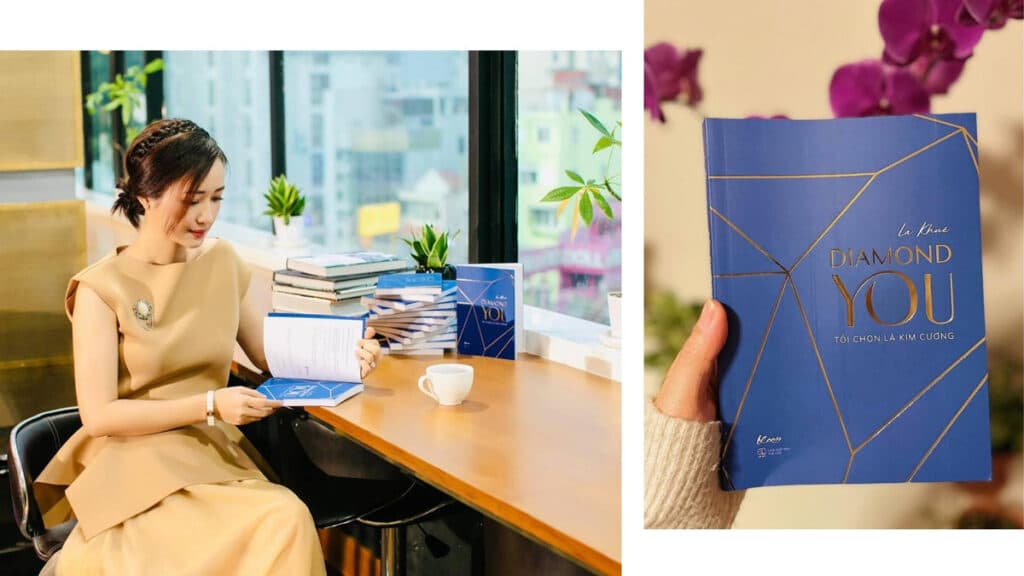
Chi, are you ready for the questions about the five levels of the diamond?
Chi: I am ready.
And I want to send my thankful notes to La Khuê. She is my business coach, and the author of a very interesting book on the topic of personal branding, also known as “nhân hiệu“. This is the concept that we’re using for discussion. Thank you, La Khuê, for providing us with the framework for our talk today.
Level 1: Diamond hidden in the rock – Silent Hero
The invisible steps to success
An: Since the book Diamond You is no longer available in the market and hasn’t been reissued, please allow me to read from the book the definition of these diamond levels before asking the question.
The first level of the diamond, level one, is the “Diamond in the Rock“, also known as the “Silent Hero“.
Even if these people are recognized as experts by their clients, colleagues, and employees, those at the first level of the diamond are not famous outside of the company or organization that they belong to.
When we talk about Chi, we will think of the brand The Present Writer, which is a highly renowned personal blog among many readers.
Chi, from what I have learned, you sometimes mentioned that you had other blogs in the past, some even in English.
I am curious to know what your previous blogs were about, and what did they lack to succeed like The Present Writer?
Chi: I think there are many “Silent Heroes” in our lives, as well as in businesses, organizations, and at schools. They are people who do well in school, who are role models at work, have great reputation in their field, or contribute a lot to their own projects or those of others.
Personally, I feel like I also started my journey as a “Zero to Hero”.
When I was younger attending schools in Vietnam, I was very much interested in Literature and writing. During that time, I wrote many blogs on platforms like (Yahoo) 360°, Blogspot, WordPress; I had several of them, at least 4 or 5.
The reason I wrote blogs was because I was learning a lot in life and in my work. I found my studies and internships enriching and really wanted to share what I figured out with others. Intuitively, I thought if someone had told me about these discoveries earlier, I wouldn’t have had to go through so many difficulties.
However, when I started writing blogs, there were very few readers, and I mainly shared with my friends, who found my articles useful. But it was rather low-key.
When I created The Present Writer, it was my first blog to achieve sustained success.
The cause of « failures »
Chi: Back to An’s question about why my previous blogs failed or did not gain popularity like The Present Writer, it was mainly due to my mindset at the time.
In the beginning, with my previous blogs on (Yahoo) 360°, Blogspot, or WordPress, I used free platforms, and I did not invest much in them. I did not even have a domain name; I just used the free options and customized the website name a tiny bit.
I had no intention to create something lasting nor to contribute beyond my circle of friends, of my university class, or of my internship place. I did not have a long-term vision for these blogs.
And, if I could make something quickly, I could abandon them just as easily.
However, when I created The Present Writer, I felt the desire to build something more serious.
I made a complete website, bought my own hosting and chose the domain name ThePresentWriter.com, rather than using “.wordpress.com” or “.blogspot.com.” The domain name was shorter, and I had a dedicated host, which allowed me to build the website with full control, ready to create my first true home online.
Before, I had no long-term vision nor commitment. Even though I always wanted to share things with others, my vision did not go far. That is why my previous blogs, as “Silent Heroes,” never reached the next level of the diamond, like what The Present Writer was able to achieve.
Level 2: Rough Diamond – Local Artist
The article that created the tipping point
An: The second level of the diamond is the “Rough Diamond,” also known as the “Local Artist“.
Their fame begins to expand beyond the boundaries of their company or organization. These people can also come from startups. They start to engage in external activities, such as public speaking or writing blogs. They are like local artists who are eminent within a small to medium community.
According to what I learned, you have been writing The Present Writer for 6 years, from the moment you established a domain name for the blog as you mentioned earlier.
How long did it take for you to transition from level 1 to level 2?
Chi: That is a very interesting question, because time is something relative.
In fact, when I launched The Present Writer blog, the first articles I wrote were edits of the old articles from my previous blogs (the ones that I closed). That is why it inherited years of my previous works when I used to write but did not really invest seriously.
This way, the early articles of The Present Writer started to garner interest because I selected the best articles that got good reaction when I wasn’t yet known.
I noticed that a few people started following me, but of course, it was still very modest. Initially, my mother was the most loyal reader of this blog.
About my third month of writing, I published my first viral article entitled “Why I Choose Minimalism?“.
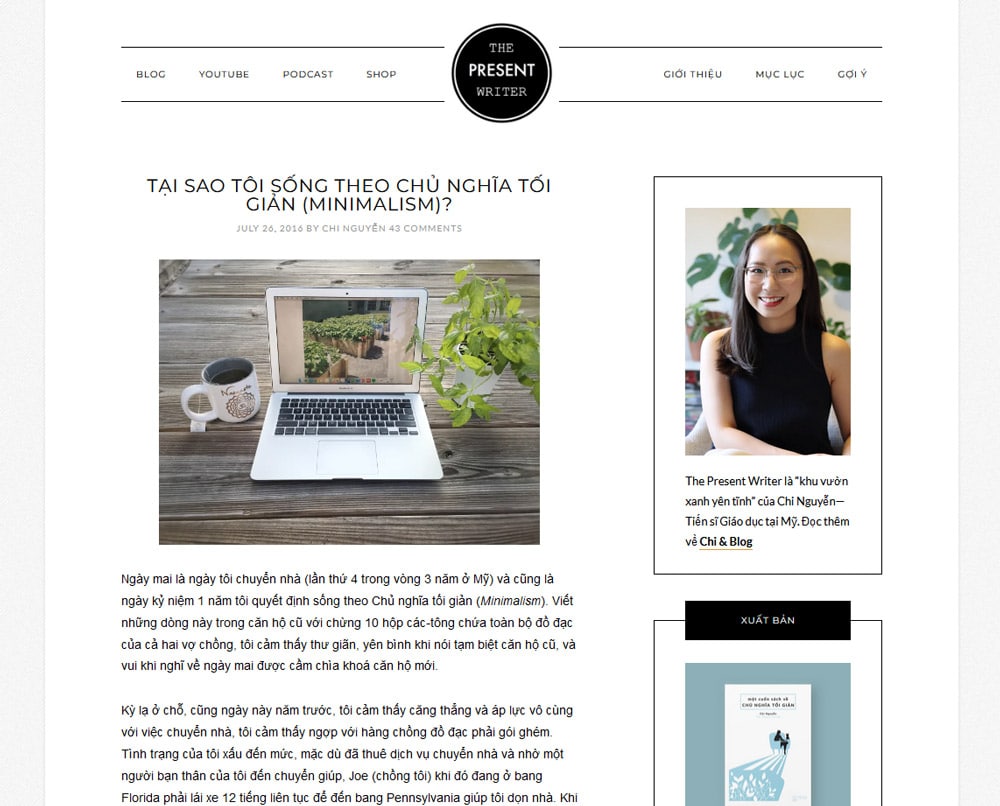
This article was about my decision to embrace a minimalist lifestyle. The story behind this article is that I loved reading about minimalism, and at that time, I had been living a minimalist life for over a year. However, when I searched for articles or information in Vietnamese about minimalism, there were hardly any comprehensive articles on the subject. There were translations from English, interviews, or similar articles, but there was no extensive Vietnamese article on minimalism, and there was no well-known personality who had actually lived as a minimalist in Vietnam either.
This surprised me a lot. I wondered, “Why no one wrote about this?”, or “Why couldn’t I find what I was looking for?”. At that time, I was already a Ph.D. student, and grinding resources for data was my strong suit, so I was rather confident in my ability to find the correct information.
At the same time, a second question crossed my mind as well: “Maybe Vietnamese people aren’t interested in this topic at all? In that case, what will happen if I write about this topic, and no one would even react? Why am I the only one interested in this subject?”. Nevertheless, I decided to write. The article’s focus was more on “Why I live by the principles of minimalism?”. Herein, I emphasized the “I”, not someone else, and not the general definition of the minimalist lifestyle.
This was the first article that generated a significant reaction. People started sharing it massively. After just one night, I woke up overwhelmed by the number of shares. And the next day, many other media outlets reposted this article or just straight-up copied it.
That is when I realized that I needed to add a copyright clause to my blog. But I had rarely seen my writings to be copied to this extent. It was at that moment that I understood what the spreading effect was, what “going viral” means. It was also at that moment that people began to know me more outside of the university (where I was still a Ph.D. student), or outside the group that already knew I had a blog about education and lifestyle.
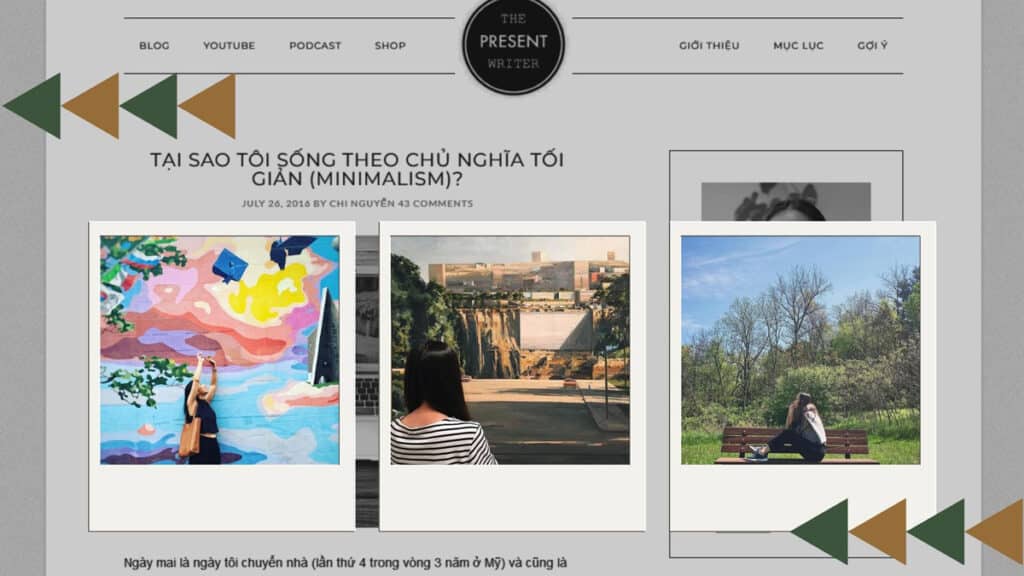
The moment when passion becomes the tool to polish the diamond
An: Earlier, you mentioned that you were confident in your ability to find the right information as a Ph.D. student. However, the construction of your blog mainly relies on your writing skills, on your articles.
When did you know that your writing ability was sufficient to turn you into a diamond?
Chi: In reality, writing has always been in my veins, in my blood.
I grew up in a family with a tradition in writing. Three generations of my family are journalists and writers. My grandparents were journalists, my mother was a journalist, and my father also worked in the field.
As for me, my study was specialized in Literature for my 12 years at school. At the time, I simply thought I was good at this subject. I loved studying, analyzing, and doing research on Literature.
I also had to write rather decently to be accepted into these special classes and be part of the national team of the best students in Literature. However, my style at that time was very different. It was writing based on emotions derived from an existing text by another author; it wasn’t really creativity.
It was still writing, but it did not come from my own experiences, and it wasn’t based on what I “created from scratch”.
Later, when I became a Ph.D. student, I wrote research articles. It was also a form of writing, but it was rather a synthesis of other research integrating with my own critical thoughts. It was yet another type of writing.
Then came the time when I started writing a blog, it was different. Writing a blog means writing more about my personal experiences and writing with my own emotions. It means that the material was not someone else’s but my own life.
All along, I always know that being able to write was something very special to me. It was my gift. That is the reason why I named my blog The Present Writer. The word “present” has many meanings, one of them is “gift”. I think writing is the gift that destiny bestowed upon my family, and I was fortunate to inherit it.
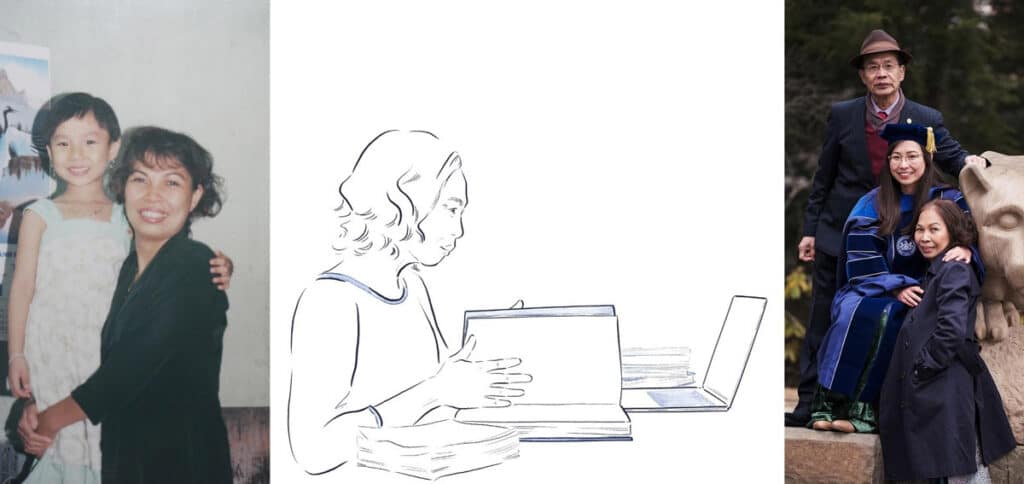
Although writing and Literature has always been my strong suit and passion, it seemed to turn its back on me when I was younger.
For example, in my family, it was a common knowledge that becoming a writer did not bring in much money. As a matter of fact, even though my parents worked very hard, we struggled to make ends meet. It wasn’t a lucrative career. Choosing Literature often means living with the hardship of growing up in a family that deeply loves literature and writing but does not know prosperity.
Every time I succeeded in Literature, it would come at a price.
Later, when I joined the high-school Literature team for the national competitions, the university entrance examination system changed and the participation in the high-school national competitions lost all its privileges.
By taking part in the national Literature competitions, it took away from me the time to study Mathematics, English and other subjects for the university entrance exams.
Literature was always taking something else from my life in exchange for the love I had for it. It made me feel lost, it gave me pain and anguish, because I was pursuing a career that might not have a stable future.
Despite all the obstacles along the way, later, especially when I studied abroad, I realized that, every time I encountered difficulties, I always turned to writing.
For example, when I met a professor and talked to them about the idea of collaboration for research, that professor might not know me yet, they might not have read what I wrote, or they might not have even met me yet. Still, if they see an Asian woman speaking English with a strong accent coming from a foreign country, they might just reject me or ignore me on the spot. Or they might talk down to me or make comments that bluntly show that they did not really respect me. In my head, I thought, “Okay, I understand. I’ll go home and write a letter.”
Every time, I went for a letter. I knew I might not be good at expressing myself in front of others, but I was good at writing. “I will go home and write a letter to let the professor knows who I am.”
I always found inspiration in writing a cover letter, and I attached my research paper to that letter. And people’s attitudes often completely changed. They went from ignorance to acknowledgment, from contempt to respect, from discrimination to fairness.
Later on, I continued to write letters, many letters: to apply for scholarships, to buy a house, to introduce my students, to support others, to lend a helping hand…
And I realized that every time I sat down to write, something good would happen. It could be something for me, or something useful for others.
But it was always something that made a difference in the world. And I knew, “This is my diamond, this is my gift. Even when I fall, I know this is something precious, something solid, and even if the whole universe crashes on this gift, it will not just break. This gift is my light, and I can always hold it, touch it, and use it”.
For this reason, I hold onto this thought : “I might have no idea what the future will be like as a writer, but I know it is something special in me, and I can use it to bring something useful to myself and to society”.

Level 3: Cut Diamond – Rising Star
Add…
An: So you discovered that writing is your diamond, your gift, by realizing that every time you write, good things happen, and you have been always writing a lot; writing is the centerpiece of your life.
However, I feel like when we reach the next level, the diamond level 3, this purity will likely change.
Level three, “Cut Diamond,” or “Rising Star“:
The reputation of these individuals begins to expand, sometimes even to a national level.
An interesting thing is that I actually knew about La Khuê’s book, Diamond You, by watching your Instastory.
In that Instastory, you said, “Right now, I am at level two. I’ll try to reach level three in the next 5-10 years”.
Thing is that Instastory was posted in 2020. We are now in 2023, only 3 years later, and you have already reached level three!
That is why I have a question for you, and it is also something you already mentioned in the podcast: “What got us here will not get us further.” To go from the raw diamond of level two, which was filled with passion and clarity, to level three, what did you have to leave behind?
Chi: Before I talk about what I had to leave behind, let me tell you what I added to move from level two to level three.
After blogging for a while, I started to reorganize my articles on minimalism, and I received some invitations to write a book. The interesting thing is that, by writing blog articles regularly, it gives people a convincing impression that I am capable of writing a book. I have been already writing consistently for free and still meeting deadlines. Such performance also means that I might have just enough materials and discipline to write an actual book.
From there, I received an invitation to write a book about minimalism. It was my first book in Vietnamese, titled A Book About Minimalism (link Shopee).
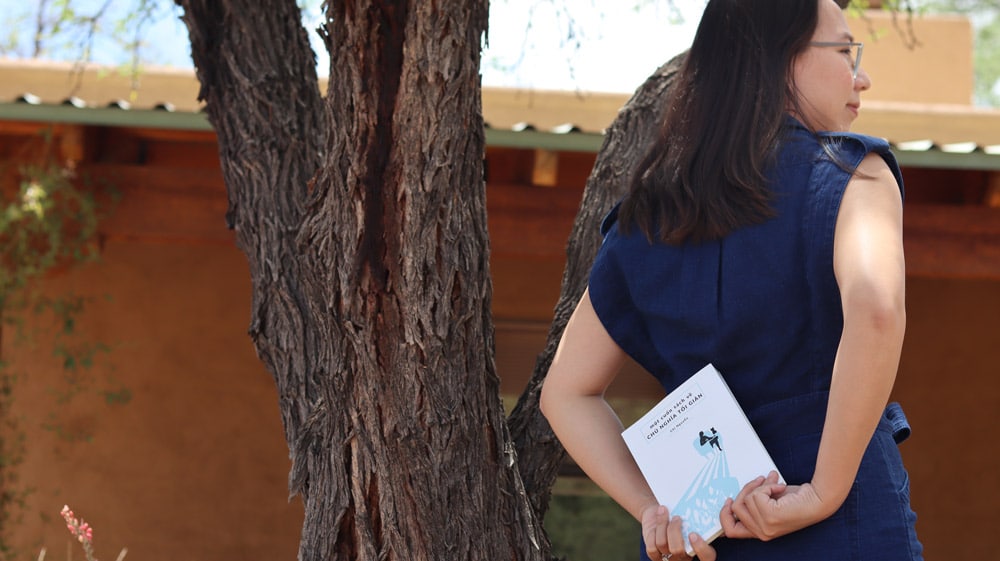
After the book was published, more and more people started to know about me because the book was widely distributed in Vietnam. Previously, when I blogged, only young people would know me. But once the book was published, even older people discover me. They read my book and recommended it to their friends and family.
I felt that publishing a book made my brand more official. I became known as an author in addition to my blogger status. That was the first step.
Then, in my life, there were significant events that caused my physical and mental health to deteriorate: In my career, I devoted more and more time to research. I also gave birth to my first child.
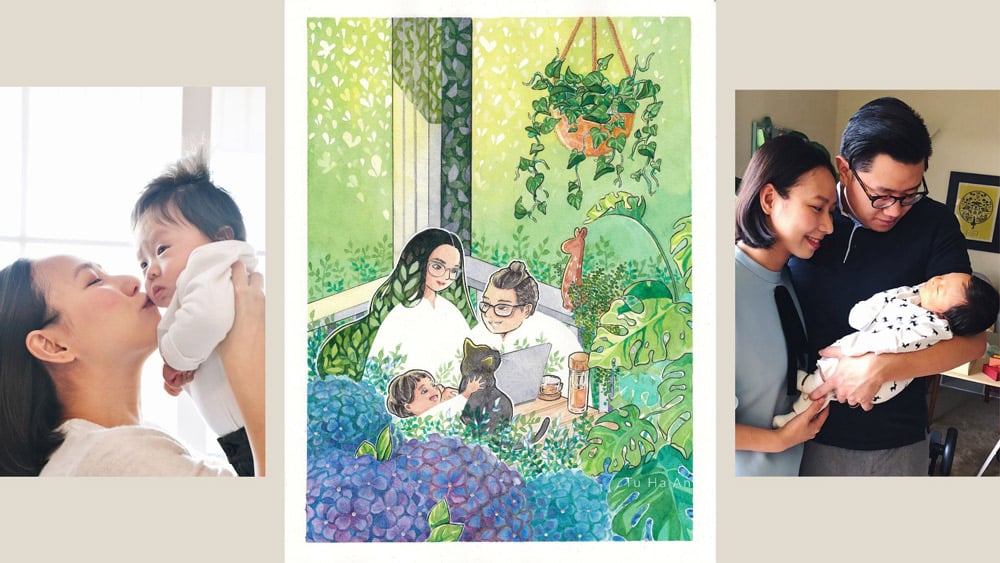
There was a period when I stopped writing before resuming it again after some time. The moment I came back to blogging was similar to when I left behind my old blogs to come back with a more serious blog. At that time, I also decided to relaunch The Present Writer by adding some elements to move to the next stage.
I did not come back just to return to my previous version, because that would mean I had not learned anything during this process. During my gap break, I matured a lot, and I missed writing; I needed to create.
Before, it was just for fun, but then I realized that I needed to give more meaning to my life. When I returned, I decided to start a YouTube channel and a podcast.
These two platforms allow people to feel closer to me and understand better what I intend to share with visuals and audio.
Back then, I had been writing blogs for about 5 years, but during that 4- 5 years, no one ever heard my voice or knew how I look like. They only knew me through my articles. When I started publishing my first video, people would comment, “Oh, is that her, Chi?”. Many thought my style was very serious, like I should be a very mature and rigid person. But in reality, I am not like that, and people were very surprised.
This made me realize that using other platforms with different communication channels would help me get closer to others. And the most important thing is not what we write, it is the message we convey. I felt that videos and podcasts allowed the messages to reach a broader audience.
For example, in a video, I could talk about productivity and show how I applied it in my life in a visible way. In a podcast, I could share very personal stories, just like in my blogs, but I did it with my voice, and it allowed the message to last longer, reach more people, and touch more minds.
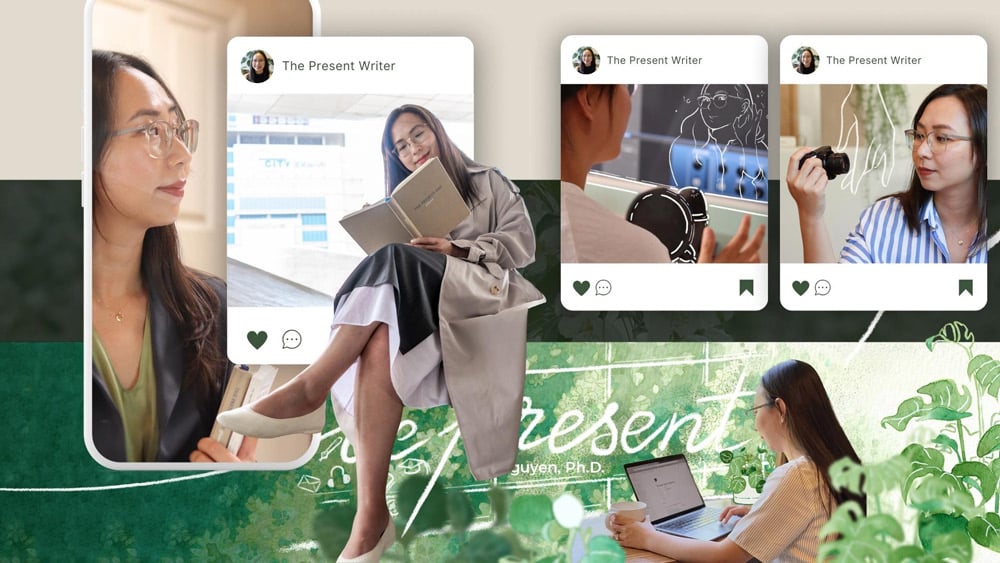
Some even said they already read my blog but did not truly understand the message until they watched the video or listened to the podcast, where I told exactly the same story. This is what I added to bring The Present Writer to the next stage.
As you mentioned, I once thought it would take me 5 to 10 years to reach the next diamond level because I only had a blog and had not yet added other content.
… and give up
Chi: When I started adding new things, I had fears like “I don’t speak well in front of a camera”, “I am not beautiful”, “My voice isn’t pleasant”, “I stutter”, “I don’t have money to invest in equipment”, or “I don’t have time”.
When The Present Writer was small, I could respond to every comment. An, even my first interaction with you was an exchange in the comments about a planner. We finally created our planner this year.
As you have seen it, I responded to every comment and every email, or at least gave a “like” to every comment. I really enjoy interacting with my readers this way.
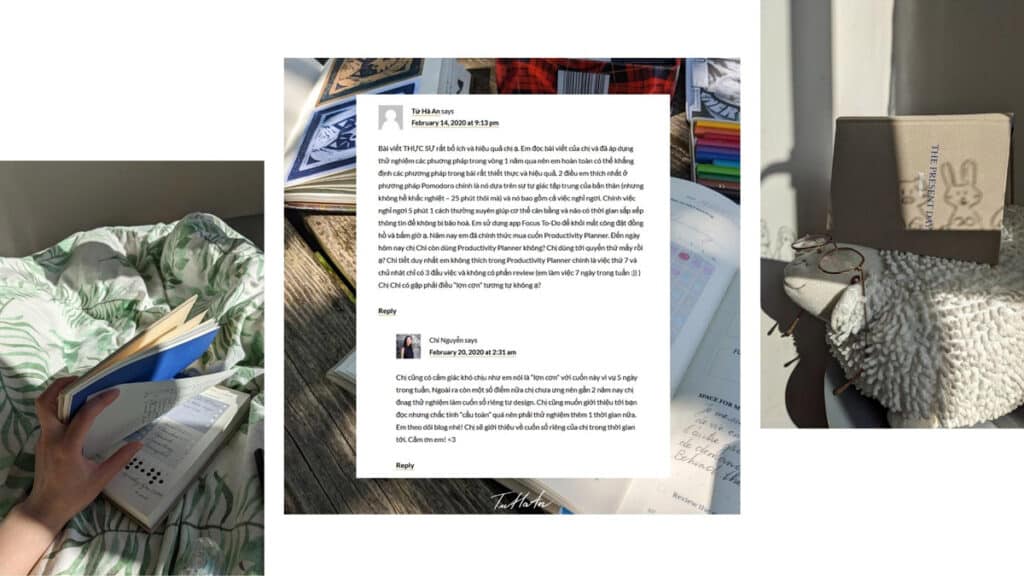
However, when my brand became larger, it was impossible for me to respond to every comment or every email. If I did, I would be exhausted. In fact, there was a time when I did become really exhausted because I always wanted to take care of each person as how I did when The Present Writer was a small brand. As a result, it took time away from me to create new things.
Therefore, I had to change my way of thinking and find other people to help me to answer recurring questions or comments. I also started to develop a system. For example, to answer a specific question, I would plan ahead my responses in a certain way.
Little by little, I earned paid partnerships. At the beginning, there were not so many partners, I appreciated them a lot and even worked for free with many people.
However, when my brand became larger, I had to be more selective and decline many opportunities, even if they seemed very good, because I could not manage them, or they did not fit my vision.
I had to say “no” to things that I used to find rather simple, like taking a nice photo of a cup of tea and posting it on social media. Or when I take a selfie with you, An, I have to think more before sharing. For example, if I post a photo of a cup of tea, people will ask me where I bought it and if it is a sponsored item. So, I had to think about whether it really fits my current brand. Because many people can use my images and contents for their benefit, and there are people with whom I am not sure I want to collaborate or allow them to use my images in a certain way. Even a selfie with you might bring discomfort to you, so I have to ask you if you are okay with me posting that photo.
I think the process that brought me to become a bigger diamond forced me to be more cautious, make more thoughtful choices, add more elements to shine better, but also to eliminate certain things to refine them.
When an “influencer’s assistant” answers our email
An: Thank you for this very insightful response. You not only talked about what you had to let go of but also what you added. You mentioned many challenges that content creators face, things we could never understand if we only see them on YouTube or read about them.
I remember a podcast where you were guest speaker, and the interviewer told an anecdote that deeply impressed her. It was when this person sent you an email, and you replied in person, and not your assistant.
That day, you explained that when content creators have their assistants respond on their behalf, it is not because they don’t care about their audience, it is because their time and effort must be focused elsewhere, like on creative and productive tasks that could add even more values for their audience.
So, it is not right that when you receive a response from the assistant, it means the content creator isn’t interested in you.
Chi: I don’t remember that particular response, but I think this is an idea I truly believe in.
It is a popular misunderstanding that people have about content creators. People think that content creators should always personally respond to every message, that they must do everything themselves to show they truly care.
Values can come in many different forms. I speak in private with some people, which is a form of personal attention. But I also talk to many people at once because I know the issues that they’re facing are shared by many others, and I say it to everyone so that everyone can benefit from the question.
There are times when I respond personally to emails because I know I am the only person who can help. But I always believe that if you receive a response from the assistant or someone else, it is not because the creators don’t care about you, but because they’re dedicating their time and efforts to activities that bring equal or even greater value to other people.
An: I wanted to add that, as a member of Chi’s team, I also know Hạnh, Chi’s assistant. I find Hạnh an extremely dedicated, attentive person. And she understands The Present Writer as a brand thoroughly.
I think Chi, along with many other content creators, selects team members who share their passion, understand the brand’s value, and are committed to the same vision.
Therefore, when you get a response from the assistant, you are actually getting a response from a very dedicated person who understands the content creator’s direction. I think it is the same as if Chi responded directly.
The important thing is to know what value this response brings to your question.
Chi: Speaking of Hạnh, I remember a story.
When Hạnh first started responding to emails as my assistant, she often received recurring questions like “How can I learn English?” or “How can I buy ‘A book on the minimalism’?”. For these cases, she already created a video playlist for learning English or a guide to purchase the book. However, if someone could not find these resources or did not see them, Hạnh was there to help.
When we started working together, Hạnh and I created response templates. For example, “Hello, I am Hạnh, The Present Writer’s assistant,” followed by the standard response that we prepared together. Therefore, if you receive a template response, it is still a response that we took the time to write, not a response from a robot.
There was a time when someone received the response once, then they asked the question again, and Hạnh responded again. And Gmail has a system that changes the text color if a response seems like a copy-paste from the previous message just by having similar contents or wording. If you use Gmail, you probably know it. When this person received Hạnh’s response the second time, Gmail changed the text color, indicating that it was a “copy-paste” response by Gmail’s standard. This person then gave us feedback that our response seemed unprofessional.
I don’t think that feedback was constructive. In my point of view, the response templates are professional materials. They provide a standard response. They show our equal attention to each and every person, express an equal treatment from our part; and then if the situation requires, we can add a personalized response.
I think this is a matter of perspective. Some people think you should respond without greetings or formalities to show that you are friendly or close enough to the community. I respect people with a different perspective. Even though I am not in their shoes and don’t share the same perspective, I respect them while making decisions based on what’s best for my team and my brand at the time.
Level 4: Fine-cut Diamond – A-list Star
How do you define “A-Class Star”?
An: Regarding the five levels of diamond, after having written that “I will try to reach the third level in the next 5-10 years,” you also wrote, “And if I succeed at this third level, I will continue until the end of my life to reach the fourth level.”
The fourth level is called “Fine-cut Diamond” or “A-list Star“:
These experts are recognized and known in a country, they seize significant business opportunities, and they can ask for considerable commission fees for themselves and their company or organization.
I’d like to know if you consider yourself currently at the fourth level?
Chi: I feel like I am getting closer to level four.
I don’t think I am an “A-list star.” But I think, in my fields, especially in my niches, I have already put myself and The Present Writer brand on the map, oftentimes either in the top 5 or top 10.
My main work is in teaching and research. We don’t talk about it often because it is not something that everyone knows, especially when I work in two different countries. In the United States, I do research on educational leadership, international and comparative education. In the past, I was working on my research rather without much of visibility.
But in the past two years, since I became assistant professor, when I attended conferences, people started to recognize me, and people started mentioning the research works that I published a few years ago. In the academic world, it takes a long time for people to discover the work that you have done before.
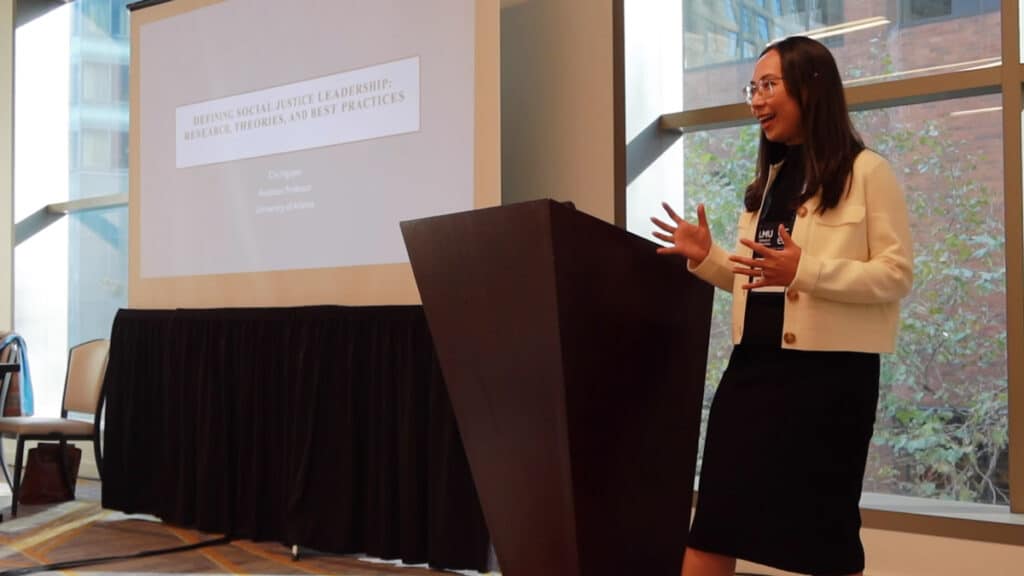
In research, I feel like I am transitioning from level three to level four, maybe more at level three than at level four. I don’t really have yet a public presence and a broad visibility like The Present Writer.
However, for The Present Writer, I feel like I am much closer to level four. When I look at the Vietnamese podcast rankings, The Present Writer is always in the top 5 or top 10. When it comes to the most recommended blog rankings, The Present Writer is often mentioned, as well as in learning-related videos. These are very specialized, niche areas, and that is what I want.
I think that if I want to reach level four in the future, I want to be an “A-list star” in my area of expertise, in my niche, in my field of research, and in The Present Writer community – wherever its members are in the world. I think I am moving towards that direction, not just going upward but also going more in-depth.
A defined balance thanks to baking
An: When you were talking about the second level, everything revolved around writing.
At the third level, you mentioned that you had to start building systems.
And at the fourth level, my guess is you might not be able to focus solely on one thing, on one passion, on one skill that you master the best. You’ll have to wear a new hat, a hat of a leader, of a manager, an entrepreneur. What would you do to balance what you do best, which is your passion for writing, with all these other responsibilities that fall upon you when you reach the fourth level?
Chi: That is an excellent question. I often ask myself the same.
Recently, when I was baking cakes, I gave this question some thoughts. I think the perfect balance is impossible to have when you transit from one level to another. Because this is life, and nothing in life is perfectly balanced.
At that moment, I was weighing flour while comparing it to the eggs and milk, and I felt that the balance should be that these two parts being equal and separate. In reality, it is not possible.
I’m an expert, but I am also an influencer. As an expert, I can do research and write about it, but maybe no one will know about it. But as an influencer, I want my messages to reach the society, so I need to make videos, records podcasts, get invited to other shows, which is becoming more common now. Still, these two aspects are not separate; they complement each other.
For example, if I am only acting like an expert, people who like numbers may find the technical contents that I share appealing, but some others might need something sweeter, messages that are easier to understand, and I cannot provide that to them being solely an expert.
Likewise, if I am too sweet, too colorful, without a research base, without data, without substantial materials, I cannot provide my audience with contents that are truly good.
I realized that all this had to be gradually mixed into my life, like how I should “fold” ingredients for baking.
For example, right now I cannot respond to all emails, so I took Hanh as my assistant, I “folded” her into my brand, and focused initially on mentoring one person.
Then, I continue to gradually “fold” more team members. When I have two people on my team, I will have to develop my leadership skills to manage these two individuals.
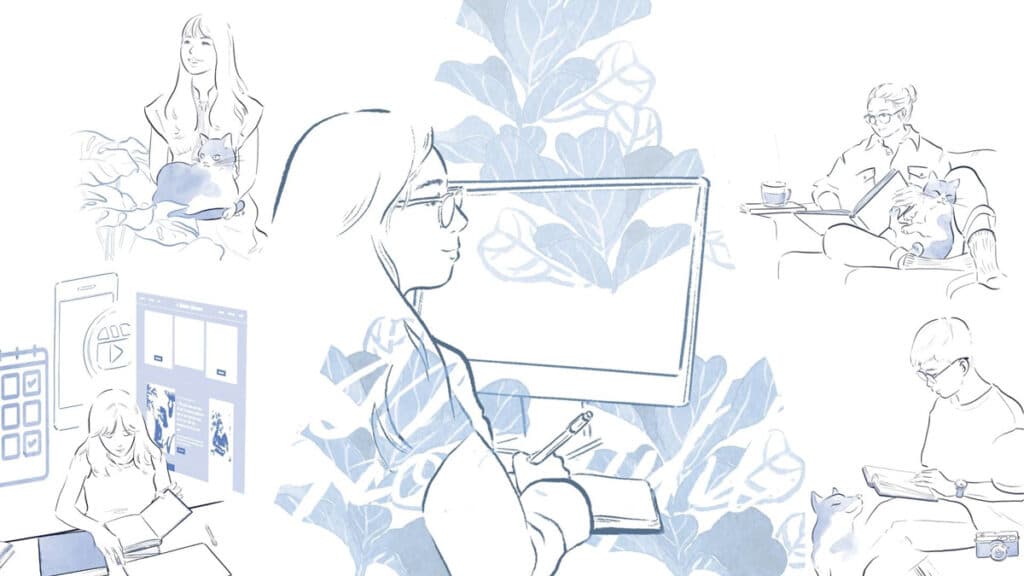
I’ll keep folding other skills. When I must address the public, I’ll add flour, eggs, milk so that the cake can be baked properly. I think nothing can be done perfectly in 50-50 ratio. If you fold things gradually, you will get what is needed to bake a cake properly.
Otherwise, the cake may look fine on the outside, but inside, it may not be baked properly. It’ll make what I do not sustainable nor authentic. Everything in life is never completely separate.
The more I go up, the more I mature, the more I bring this maturity to life through my contents, that is what I should do, that is what I should continue to do.
An: I love the way you approach achieving balance. It reminds me of a concept that a famous French business podcaster, Aline Bartoli. She is the founder of “J’peux pas j’ai business,” which means “I am too busy because I am doing business.” And she once compared keeping balance to riding a bike.
It is not a static state; it’s always moving. There are times that you have to lean a little more to one side, then to another. Sometimes you have to pedal faster, sometimes you have to slow down. But all of this contributes to maintaining balance. Balance does not mean staying still on your bike.
Chi: If you stay still on your bike, you will not move forward.
An: Or you’ll fall.
Chi: Or you’ll have to rather walk your bike. *laughs*
Who is Chi writing to?
An: I heard that the author Stephen King, who is famous for his horror novels, only wrote his books for one person, his wife. Years after years, he wrote with just one person in mind, a single reader, who is his wife.
When you write, do you have someone in mind in the same way as well? And was it always the same person at every level, from the first to the fourth level?
Chi: When I started writing blog, my style was about sharing my personal experiences. From the very beginning until today, the person that I am writing to is a younger version of myself.
I always keep in mind how I wanted at that age to hear advice, which was sometimes hard to hear and that few people would say, but if someone could tell me in a gentle, intelligent, and comprehensive manner, how much it might’ve been helpful.
Recently, I made two videos, one is entitled “Advice for Teens” and the other is “Advice for People in Their Twenties“. For these, I always go back to those moments in my life and think about how I would talk to myself during those times.
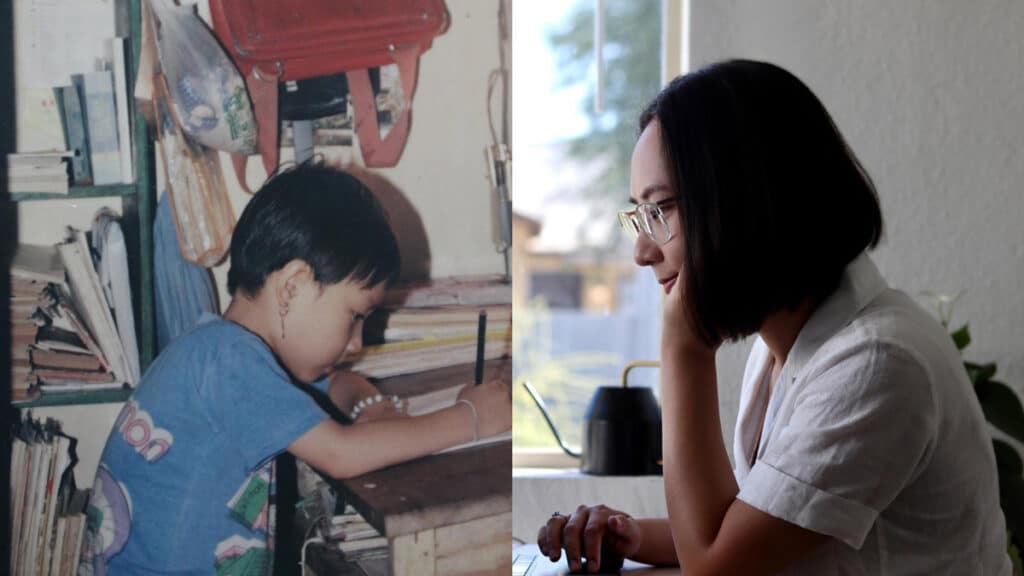
But as I grow, I realize that each person has their own situation, and the advice that I give to my younger self does not necessarily apply to someone else.
Sometimes, I think I even have intention to refuse answering certain questions because I don’t have experience in what was being asked. But as an educator, as a researcher, a professor, I cannot refuse to answer questions related to my area of expertise. Even if I haven’t experienced this personally, I can offer advice based on cases that I have studied in my research or based on my experiences in teaching.
I think of my younger self when I write, but I also take into account the different situations of other people and try to provide added values through writing, even if they’re not exactly like me. That is how I create.
The special “influencer”
An: Before we come to the fifth level, I have a somewhat special question.
Everyone, if you read Chi’s book or if you follow her blog, you might already know that there is someone who has a big influence on her path. This special person is her grandfather, journalist Nguyen Hai.
Chi, I remember that you told us that you went one time with your grandfather to collect his pay. It was also from that time that you decided to not following the writing career because it was too cruel.
Your grandfather passed away, but I am curious to know if we could imagine that he is still here with us and sees how you achieved the fourth level of diamond. What do you think he would say?
Chi: He would say, “Not bad.”
Then he’d take out a pen and say, “Print these articles so I can read them and see if there are any mistakes.”
My grandfather was a very gifted individual. He used to be the editor of the Hà Nội Mới newspaper. It is one of the most renowned newspapers in Vietnam. Editing is a refined job, and he used to read everything with a pen in hand to make corrections and add comments in the margins. It wasn’t because he was paid for it, but it was an active and engaged reading habit that he developed over time, and it helped me a lot in my research work.
My grandfather would be very surprised to see that we have media like YouTube, podcasts, TikTok nowadays. He would be delighted to see his images on these platforms because he was very artistic and appreciating of modern things.
My grandfather grew up during the French colonization in Vietnam and had the opportunity to travel abroad even when everything was still very restrictive in our country.
Here is one small story: My mother liked to wear flared pants, but back then, people were only allowed to wear straight pants, at least in Hanoi. My mother often told us of how the patrol brigades in the neighborhood would chase after people to cut their flared pants and turn them into straight pants. My grandfather was a journalist at the time, and he was even the editor of a Communist Party newspaper. Yet, he said, “I think my daughter wears these flared pants very elegantly.”
So, I think he would appreciate the modern things that I am doing. In my book A book on minimalism, I wrote, “This book is dedicated to my grandfather, journalist Nguyen Hai, because he taught me my first lesson about life in the present.” If you read the book, you know that my grandfather taught me this lesson by talking to me about his own death beforehand, and I spent his last year living in the present. I think he would be very proud that his premature passing wasn’t a total loss but brought a lot of meaning to my life and the lives of other readers.
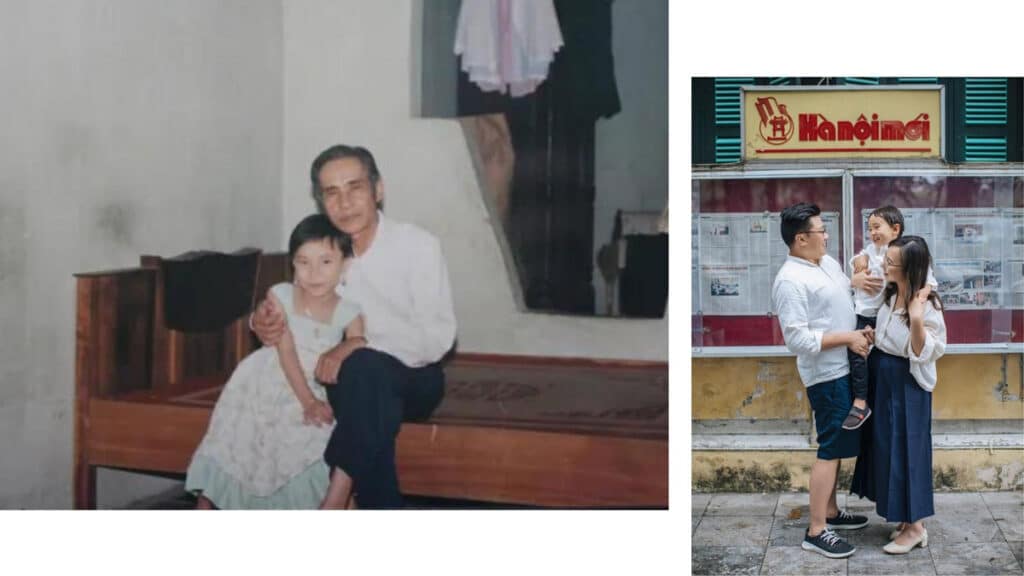
Level 5: Perfect Diamond – Global Superstar
An: Now, we are reaching the fifth level of the diamond, the highest level, the “Perfect Diamond“, or what you could call a “World Superstar“.
These are people like Bill Gates, or the second Steve Jobs, or the third Steve Jobs. In some cases, their names are closely associated with their expertise, and large companies aspire to collaborate with them.
Chi, do you want to become a fifth-level diamond?
Chi: If you asked me this question two years ago, I would certainly have said no. That is why in one of my Instagram stories, I said that I wanted to frame my life at the fourth level.
But maybe during these past two years, while maturing and meeting more people, I realized that the examples given in the book are people like Bill Gates and Steve Jobs, who are so obviously known by everyone. But there are fifth-level experts that I know, and million people also know, but these experts are not as famous as that every single person worldwide would’ve heard of them.
For example, the author Elizabeth Gilbert of Big Magic or Eat, Pray, Love, or the author Greg McKeown, from the book Effortless, that me and An are currently reading. Their books are read by millions of people, named as New York Times bestsellers, but these authors are not as famous the way Bill Gates or Steve Jobs are. They are excellent in their fields, they write books, they write novels, they spread wide knowledge about self-help or productivity.
I think if I want to reach level five, I want to be recognized internationally.
The reason why I mainly write in Vietnamese is that when I was doing my PhD in the United States, I realized that some of the knowledge I had wasn’t available in Vietnam. Besides, even if I spent a lot of time teaching in English, as an education researcher, I also wanted to have the opportunity to teach Vietnamese students for free. That is the reason why I wrote in Vietnamese rather than English or French.
In the future, if my research could be more widely known and published in international research journals, I hope to reach the international research community. This community might be relatively small, but I hope people who are interested in my field will know about me, not only in Vietnam.
Currently, it is difficult for those interested in my research field to find contents in Vietnamese, but many university students, including Ph.D. students in the United States, say they discovered my videos on The Present Writer by chance and find them very helpful. In fact, I am considering translate all my videos or create a YouTube channel with English subtitles to make The Present Writer more accessible to the international community.
Furthermore, we just launched The Present Day Planner, our productivity planner. Currently, it is available for pre-order in Vietnam, but my wish is to make it available internationally because the planner is entirely in English.
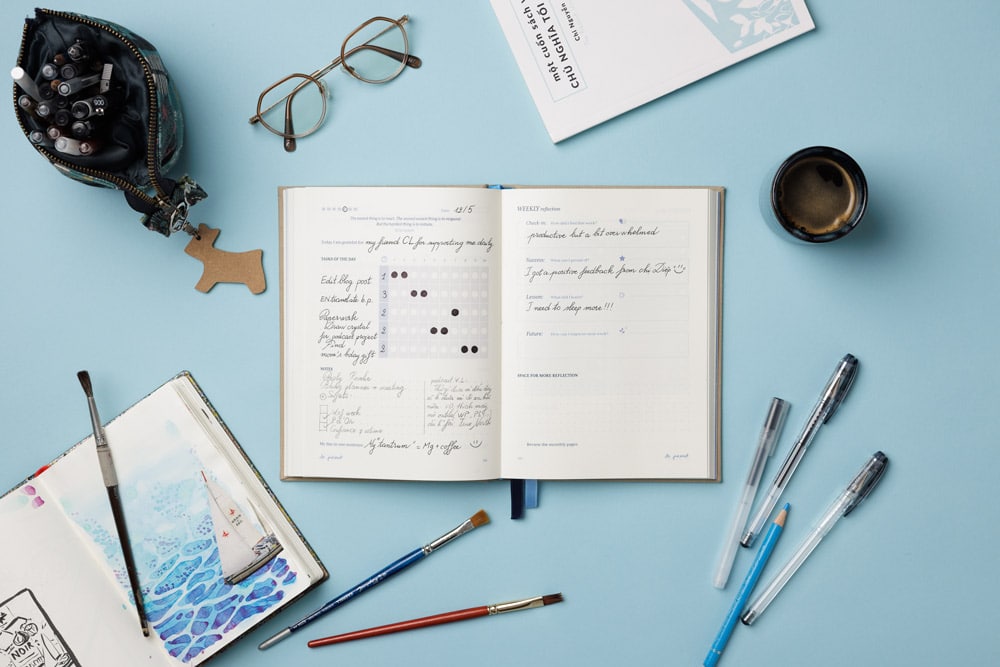
Overall, I think I am capable of going to a bigger scale, and I long to introduce The Present Writer internationally.
When I read the book Diamond You by La Khuê two years ago about these five levels of diamonds, I thought I had to become Steve Jobs or Bill Gates to reach level five. But now I think, even if maybe nobody would know about me, they will know about The Present Writer, or The Present Writer’s products like The Present Day Planner. Or else, thanks to the explanatory videos that I made, the audience may not know that I am a professor, but these contents could prove themselves to be useful and applicable in the US, in France, in the UK…
Such is my goal, and maybe my mission to make The Present Writer to be known internationally is what will allow me to reach the fifth-level diamond.
Tonight, I’ll have a coaching session with La Khuê, the author of Diamond You. I might ask her this question to see if I am suited to reach level five. If I get an answer, I’ll share it on another occasion.
An: Till now, we have gone through the five levels of the diamond. And at the end of this journey, with a conclusion still pending, I have a bonus question.
Looking at the entire process, Chi, throughout this journey of making a diamond out of yourself, have you succeeded, as an individual and not as the founder of The Present Writer, in rediscovering, collecting, or forming a diamond for your creative soul?
Chi: What a lovely question.
In fact, until now, I have never really thought of myself as a creative person or an artist.
Looking back, I think I was a very creative child. I used to write, do poetry, and draw. Even if my stories weren’t beautiful, my poetry wasn’t great, and my prose wasn’t excellent, I loved expressing myself.
However, I never thought of myself as creative, but rather as someone who studied well, had knowledge, and expressed that knowledge in a unique way. For example, by expressing my knowledge through writing, through infographics or illustrations to make my ideas come alive, or through the use of concrete examples to make them more vivid. I never was so bold to think that I was a creative person.
But as a matter of fact, I think I have always been creative. Because creativity does not necessarily mean creating grand works of art, holding big art exhibitions, or becoming a professional artist like you, An. Even if I may not draw as well as you, I want to be creative, I want to express myself and capture the beauty of life in my own way, whether through photos, sketches, or illustrations. I feel no shame in doing it; I don’t think I do it to show off. I do it because I am a creative person.
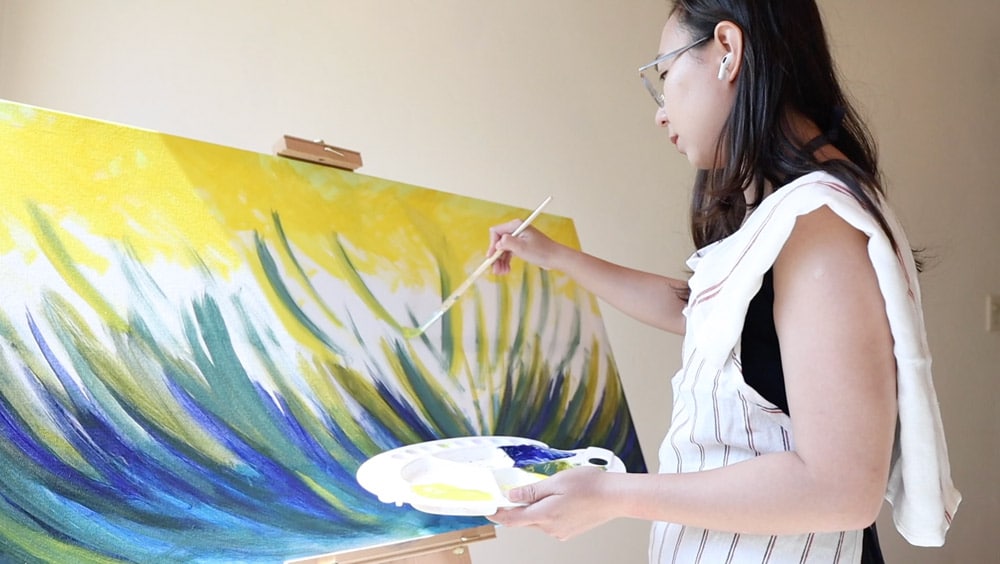
I think after this trip with you, I’m ready to tell people that I am a creative person. And it does not mean that I will not be a good researcher. Research and creativity are not necessarily mutually exclusive.
An: That is a very, very beautiful conclusion for our conversation today, an open definition of creativity. Everyone, I hope you were able to read this article to the end, I hope you enjoy what Chi has to share with us and that you have just enough materials to have some thoughts with respect to who you are and your own creative soul.
As for Chi and me, after this interview, we’re going to visit an art museum! We will open our sketchbooks, take out our phones, shoot photos, make sketches, and jot down our thoughts.
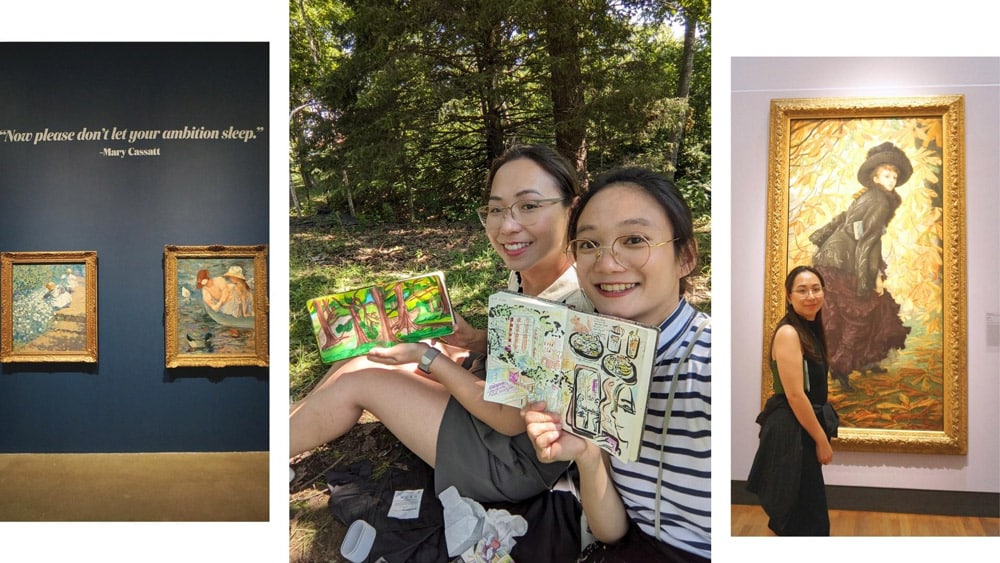
You can find Chi on her blog The Present Writer as well as her YouTube channels The Present Writer and The Present Writer Podcast.
Be present & Keep creating!
Tu Ha An
*Please consult the information on Copyright & Intellectual Property before copying or mentioning the content and images of tuhaan.com



